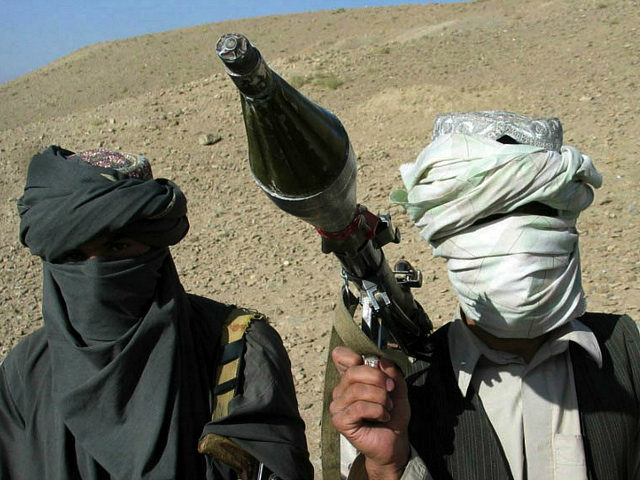The new chief of the Afghan Taliban Haibatullah Akhundzada “openly taught and preached” at the Al Haaj mosque in Pakistan for 15 years and left two days after he was named the jihadist group’s new leader in May, Reuters exclusively reports, citing the leader’s associates and students.
Al Haaj mosque is located in in Kuchlak, in Baluchistan province, near Quetta in Pakistan.
Reuters points out:
In Quetta itself, pro-Taliban jihadi ideology is openly embraced, and Taliban sources say the group’s ‘Quetta shura,’ or council, has met sporadically in recent years to make important decisions including choosing new leaders.
Pakistan, however, denies the Taliban leadership operates openly.
There are several pro-Taliban political parties in Pakistan, notes Reuters.
Akhundzada said “we would not give up our jihad, that we would never negotiate with the puppet government in Afghanistan or talk to the U.S.,” said Pai Khan, now an activist for a pro-Taliban party, Jamiat Ulema-e-Islam-Fazl, in Quetta.
Quetta has long been considered the headquarters of the exiled Afghan Taliban leadership.
Two days after he was declared the Taliban’s leader in May, following the execution of his predecessor Mullah Akhtar Mansour by a U.S. drone strike in Pakistan, Akhundzada crossed into Afghanistan through the porous Af-Pak border that serves as a sanctuary for terrorists on both sides. Mansour killed in Pakistan when his car was struck as he crossed the border from Iran.
The new Taliban leader has been described as an extremist religious cleric, rather than a soldier.
Reuters reports:
Details of Haibatullah Akhundzada’s life in Kuchlak, near the city of Quetta, have not previously been reported, and could put further pressure on Pakistan to do more to crack down on militants openly living there.
The row over how far Islamabad will go to get rid of jihadi fighters and leaders has hurt relations between Pakistan and Washington, in part because nearly 10,000 American soldiers are in Afghanistan supporting the war against insurgents.
While Afghanistan is combating terrorism on its side of the border, Pakistan has been accused by the U.S. and Afghanistan of providing a safe haven for the jihadists on its soil. The strongholds of the most prominent jihadi groups in Afghanistan — the Taliban, al Qaeda, the Islamic State (ISIS/ISIL) — are located in provinces that border Pakistan, making it easy for them to launch an attack on Afghan soil and go into hiding across the border into Pakistan.
The U.S. strikes that executed Taliban leader Mansour in May and took out Osama Bin Laden nearly five years earlier infuriated Pakistan but reflected America’s growing impatience over Islamabad’s inaction against Washington’s enemies despite receiving millions in U.S. taxpayer funded aid.
It was not until recently, that the United States suspended more than $300 million in aid funding to Pakistan for its refusal to combat the al Qaeda and Taliban-linked Haqqani Network, considered the greatest threat to U.S.-led coalition forces and their Afghan counterparts.
The Taliban spokesman Zabihullah Mujahid said Akhundzada lived in the mosque and religious school in Kuchlak, while he served as the jihadist group’s shadow chief justice of its sharia-based legal system during the Taliban’s five-year rule that ended in 2001.
However, the spokesman denied the allegations given by Akhundzada’s associates that the leader had left Kuchlak in May of this year, saying instead that he left place after being named deputy leader in 2015.
A spokesman for the U.S State Department’s South Asia bureau told Reuters it was “not in a position to confirm Haibatullah Akhundzada’s whereabouts, past or present.”
“Once he became Emir, he left with his whole family,” said Hafiz Abdul Majeed, who runs the Al Haaj mosque.
“You can’t teach religion and run [the Taliban’s] government at the same time. And it would of course have been dangerous for us and the students and the mosque if he remained here,” added Majeed.
Meanwhile, Pakistan alleges it does all it can to go after terrorists.
Reuters reports:
[Sarfaraz] Bugti, Baluchistan home minister, said Pakistan had taken measures to stop militants criss-crossing the frontier, including tougher checks that would stop Taliban fighters using fake Pakistani documents to travel, as Mansour did before he was killed.
Bugti suggested the terrorists in Pakistan are hiding among the nearly four million Afghan refugees in who have lived in the country for decades.
“It is not possible for us to predict who among the refugees will become the president of Afghanistan or the leader of the Taliban,” Bugti declared.
He failed to acknowledged that Pakistani jihadists who carry out attacks in Afghanistan and India are also operating within Pakistan.
Reuters notes:
Colleagues and students described Akhundzada, thought to be in his mid-50s and originally from [birthplace of the Taliban] Kandahar in Afghanistan, as a studious disciplinarian who slipped out of Kuchlak two days before being named Taliban chief…Several associates said Akhundzada lost family members in the Afghan war following U.S.-led military intervention to drive the Taliban from power in 2001.

COMMENTS
Please let us know if you're having issues with commenting.